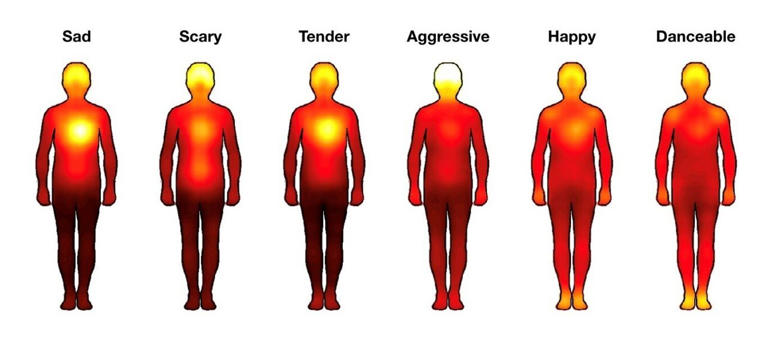Emotions from Music
Most people know the power of music and the emotions music can invoke. Listen to a happy song with an upbeat tone and you may find yourself tapping your feet. Listen to a sad song and it may bring tears to your eyes.
In fact, research has shown that music can activate our autonomic nervous system and even cause shivers down the spine.
A fascinating new study also suggests that music’s power to unify emotions and movements may have played a role in human evolution, fostering social bonds and community.
Music and Emotion Research
The recent music and emotion research study out of Turku PET Center in Finland reveals that music’s emotional impact transcends cultures, evoking similar bodily sensations around the world.
Researchers found that happy music energizes arms and legs, while sad tunes resonate in the chest.

The results of the study entitled “Bodily maps of musical sensations across cultures” were on 25 January 2024 in the Proceedings of the National Academy of Sciences.
This cross-cultural study had a total of 1,500 participants who completed an online survey.
Western and Asian participants rated the emotions and bodily sensations evoked by Western and Asian songs.
The emotions and bodily sensations evoked by music were similar across Western and Asian listeners. The bodily sensations were also linked with the music-induced emotions.
“Certain acoustic features of music were associated with similar emotions in both Western and Asian listeners. Music with a clear beat was found happy and danceable while dissonance in music was associated with aggressiveness. Since these sensations are similar across different cultures, music-induced emotions are likely independent of culture and learning and based on inherited biological mechanisms,” says Professor Lauri Nummenmaa.
Similar to universal facial expressions of emotion, this recent musical study suggests that music’s influence on the body is universal across cultures. It also suggests people moving to music in all cultures and synchronized postures, movements and vocalizations is a universal sign for affiliation.
The researchers suggest that music may have emerged during the evolution of human species to promote social interaction and sense of community by synchronizing the bodies and emotions of the listeners.
Universal Emotions in Music
 The idea that music produces universal emotional responses has been studied before.
The idea that music produces universal emotional responses has been studied before.
Research led by Eline Adrianne Smit and colleagues from the MARCS Institute for Brain suggests certain elements of music are hard-wired into the human central nervous system.
Smit and colleagues asked musicians and non-musicians in Sydney, Australia as well as different communities from Papua New Guinea with varying degrees of exposure to Western music, to associate major and minor melodies with either happiness or sadness.
The researchers found that the degree of familiarity with Western music corresponded with the association between major melodies with happiness, and minor melodies with sadness.
This study suggests that familiarity through cultural exposure plays and important factor when associating major and minor melodies with happiness and sadness respectively.
Interestingly, major chords tend to appear more frequently than minor chords in popular music and research shows that humans are likely to attribute positive emotions to things that we are familiar with.
